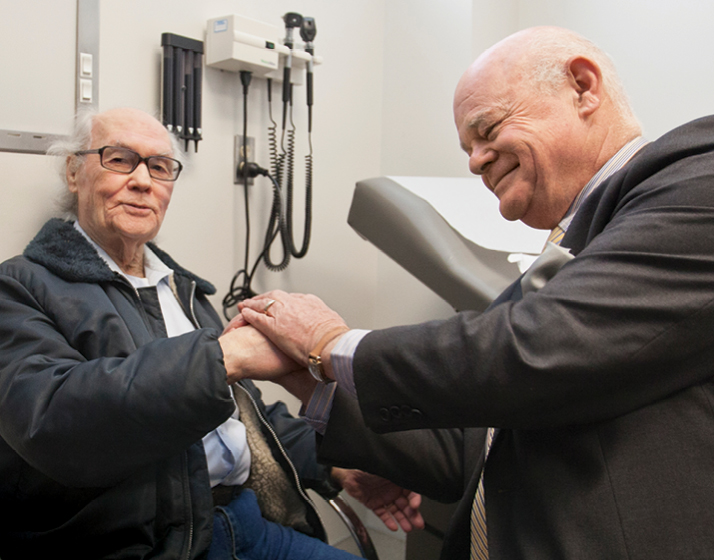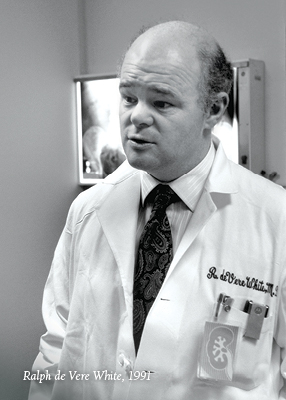
End of an era
Ralph de Vere White leaves indelible mark on the cancer center
Ralph de Vere White, whose masterful ability to unite scientists and clinicians throughout UC Davis to create one of the nation’s leading cancer centers, will retire after 20 years as its leader on June 29.
De Vere White’s legacy, by all accounts, will be one of stunning accomplishment. A renowned urologist, he contributed significant knowledge to the understanding and treatment of prostate and bladder cancers. A beloved physician, his relationships led to lifelong friendships with patients and millions in philanthropic contributions to the cancer buildings, its programs and research. A tenacious leader, his ability to build and inspire teams of scientists and clinicians now serves as a model for the rest of the UC Davis Health System.
“The creation of the cancer center was a really critical mechanism that helped transform UC Davis into a first-rate research medical school,” says Lars Berglund, senior associate dean for research and director of the Clinical and Translational Science Center at UC Davis. “Ralph de Vere White opened the doors and created the conditions to make everything flourish.”
The great beginning
A native of Dublin, Ireland, de Vere White joined UC Davis in 1984 as chair of the Department of Urology, where he assembled a team from basic sciences, pathology, urology, and hematology and oncology at UC Davis and other institutions. Together they won the country’s first National Cancer Institute program project grant to conduct multi-disciplinary prostate cancer research.
The grant fueled work that led to the detection of mutations in the p53 gene in advanced prostate cancer — and sparked additional discoveries into the genetic underpinnings of prostate and bladder cancer. And it was the model to create other research efforts that would lead to the cancer center’s designation by the National Cancer Institute (NCI) in 2002.
As he’s known to do, de Vere White uses a sports analogy to describe his leadership approach then — and now.
“You have to recognize that you can’t be the quarterback, the cornerback and wide receiver,” he says. “You have to be the coach. You have to feel you win when the team wins, and you lose when the team loses.”
After then-cancer center director James Goodnight left to become chair of the Department of Surgery in 1996, de Vere White stepped into the role, an opportunity he calls “a chance to put more people together and to build something bigger that would have more impact on cancer. This was a dream come true.”
Primo “Lucky” Lara is a longtime medical oncologist at UC Davis who now oversees the cancer center’s translational research program, which takes work on treatments and technologies from laboratories to patients. Lara was quick to work alongside the new leader.
“He thinks of cancer in a global way,” says Lara, adding that de Vere White has been an important mentor. “He recognized long ago you need multidisciplinary care to maximize outcomes. He was an early adopter of the team science approach.”
Of de Vere White’s vision, Lara says, “I drank the Kool-Aid. I believed in the mission. I thought that even back then we had all the elements. We just needed strong leadership to pull them together. Ralph was that.”
Paving the road to NCI designation
Achieving designation was a goal from the start, says de Vere White. The federal stamp of approval would differentiate the center from others in the region and bring core funding, money later leveraged to garner more grants and philanthropic dollars. Because designation signified that the center had the infrastructure to produce cancer discoveries, the first order of business was to recruit a basic science leader.
“It had to be someone who was innovative, cooperative, interactive and comfortable in himself or herself,” he says.
A campus-wide search committee found that leader in Hsing-Jien Kung, an expert in molecular and cell biology with a strong research portfolio and who already had ties to UC Davis scientists. Kung arrived in 1998 with a great capacity to recruit talented researchers across the scientific spectrum who were willing to be part of the team. His presence “legitimized the cancer center,” de Vere White says.
Soon afterward, the cancer center had a remarkable opportunity to collaborate with the Lawrence Livermore National Laboratory (LLNL), which at the time was known mostly for its thermonuclear weapons development and work on Ronald Reagan’s Strategic Defense Initiative, known as “Star Wars.” The Laboratory was expanding to include non-defense research and wanted to utilize its expertise to develop technologies for cancer research.
The idea had its detractors, both at UC Davis and the Laboratory, but eventually, as de Vere White says, the lab’s “cool stuff” won the day, and the emerging relationship would become a key component of the cancer center’s successful bid for NCI designation.
Ken Turteltaub, an LLNL toxicologist with long ties to the cancer center, says de Vere White has been instrumental in keeping alive the novel partnership.
“I don’t know if (the partnership with LLNL) would have happened without Ralph,” Turteltaub says of the collaboration. “He has a passion and enthusiasm for science and cancer that is addictive. He draws you in, and once you’re in, it’s hard to walk away.”
Other collaborations emerged, including with the university’s renowned School of Veterinary Medicine, the Department of Biomedical Engineering and the College of Biological Sciences.
Wolf Dietrich-Heyer, professor and chair in the Department of Microbiology and Molecular Genetics and co-leader of the cancer center’s Molecular Oncology Program, researches how the repair of broken strands of DNA inhibits the ability of chemotherapy and radiation to kill cancer cells. He said that without the encouragement of Kung and de Vere White, his work may never have evolved to reach the prominence it has in the scientific community.
“Ralph really represents what I think an academic leader has to be to be successful, from building a team, acknowledging individual contributions, having a common cause, but also being able to make decisions and move forward,” he says.
James Willson, a Texas oncologist who led the NCI’s external advisory board that helped the cancer center in its bid for designation, and continues to provide guidance, agrees.
“UC Davis had the components for an outstanding cancer center, but did not have what was needed (for designation) until he arrived and orchestrated putting the complementary parts together,” Willson says. “It’s very clear that UC Davis has since emerged as one of the outstanding cancer centers in America.”
Not to be lost in the story of success is de Vere White’s dedication to the care of patients, both his own and those of every other provider on staff. As a urologist, de Vere White was known for his expert surgical skills, which combined with his belief that non-surgical approaches should always be considered when tackling a difficult case. He was also known for the deeply personal connections he made with patients — the basis for his mantra: “our goal is to make the lives of patients with cancer better.”
Patti Roberts of Sacramento will never forget de Vere White, who cared for her father Raymond Roberts, who had bladder cancer. She said she is “grateful threefold” for his medical expertise, his “humanity” and his “Irish charm,” which he showed them on occasion when she and her father went to the family’s pub in midtown Sacramento.
“He gave my 80-year-old father the gift of 12 more years of life,” she says. “He always communicated warmly and directly with us. And when my father and I would go over to de Vere’s Irish Pub on a Sunday night he would insist on buying pints and sharing toasts with us.”
Always one to deflect praise, he credits Jeanine Stiles, director of cancer center administration, and her staff, for the seamlessness of scientific and clinical enterprises.
“If we hadn’t had Jeanine and the staff she put together, this might have remained a marvelous idea that didn’t quite get translated,” he says. “Without the nurses and the staff who are going to deliver this care, you are never going to fulfill the mission. It’s an ultimate team effort.”
A force to be reckoned with
Dapper in elegant suits that seamlessly blend plaids with paisley ties and striped pocket squares, de Vere White’s charm, intellect, sense of humor and sincere humanity is matched with a fierce tenacity and determination. Faculty members and managers can recount disagreements, sometimes heated, but note that they typically result in a commitment to do the right thing for the right reasons, and with no hard feelings.
“He’s had very few interactions where he wasn’t able to get the person to turn around,” says Stiles, who has been de Vere White’s closest professional partner the past 17 years and knows him better than anyone at the cancer center. “For Ralph, it’s always ‘How is it going to benefit the patient, the (researcher’s) career, and the global aspects of the health system and broader region.”
That sense of urgency and mission is contagious among the center’s faculty and staff, who share his drive and enthusiasm, and know that his hands-on approach has paid off. The evidence is the cancer center’s NCI designation in 2002 and the even more prestigious “comprehensive” designation in 2012, which put UC Davis in the top tier of centers in the country. UC Davis’ comprehensive status was reconfirmed in May.
De Vere White also led the charge to raise the money needed from within and outside the institution to nearly double the size of the cancer center, a project completed in 2012. The larger center now houses the pediatric clinic and infusion center, and has additional space for clinical trials patients.
Even as he contemplates retirement, de Vere White has his eyes on the cancer center’s future. He wants to make sure that every area resident has access to early-phase cancer clinical trials through the emerging Sacramento Citywide Oncology Program, that everyone gets cancer-preventive vaccines, that children grow up without suffering the latter effects of their treatment, and that real progress is made in the fight against the thorniest advanced cancers.
“We have walked the walk. But we should never be ‘there’ yet,” he says. “If we are, we’ll just go backwards.”

